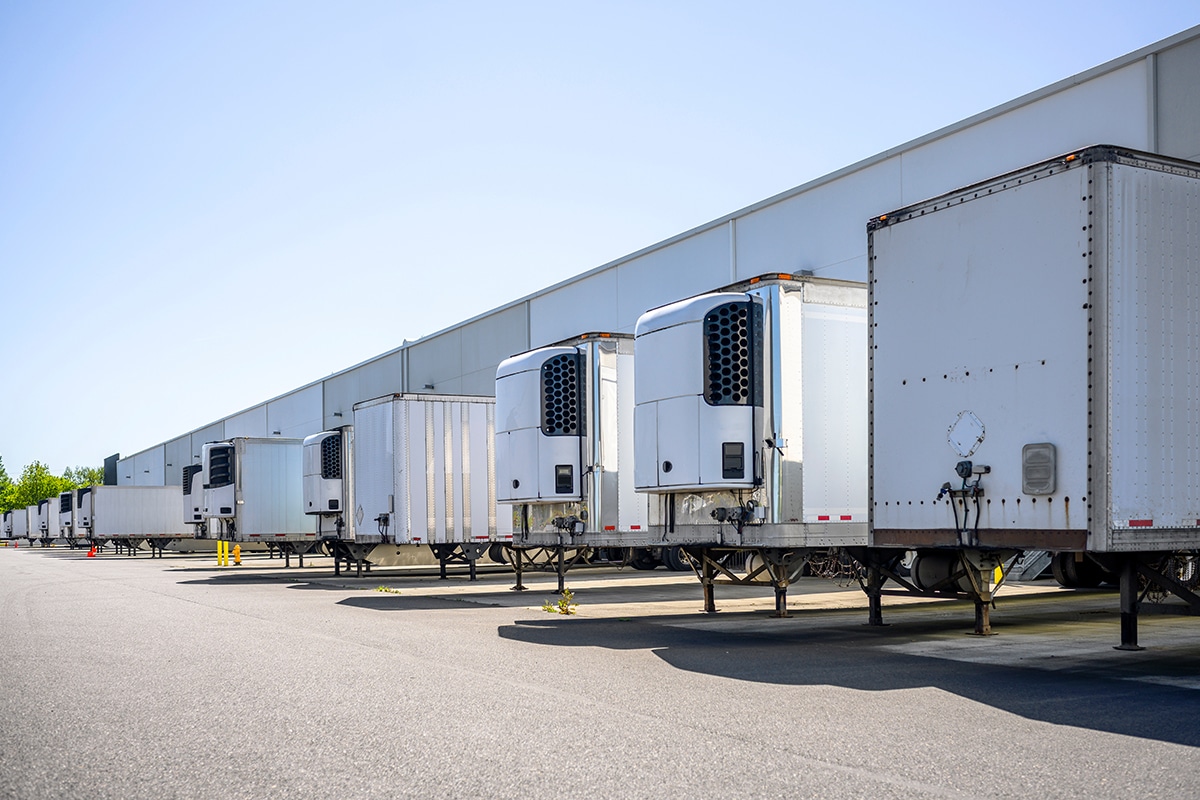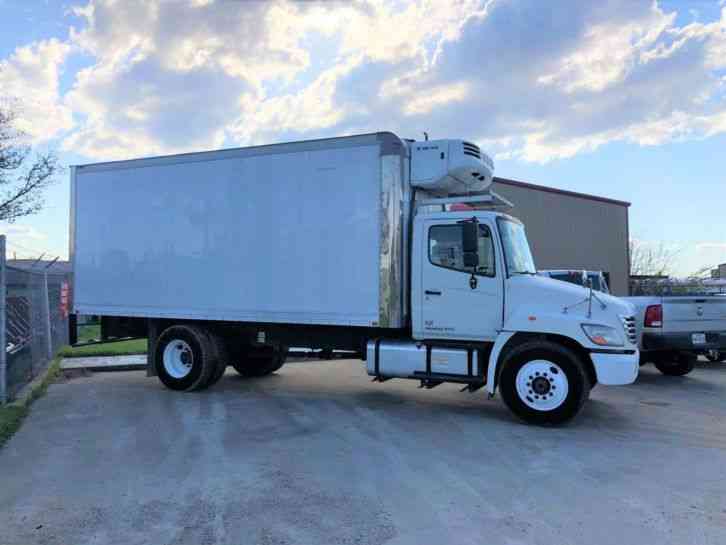Thermo King Truck Refrigeration Units: Ideal Alternatives for Temperature Level Control
Leading Advancements in Transportation Refrigeration: Enhancing Performance and Security
The landscape of transport refrigeration is undergoing considerable improvement, driven by developments targeted at boosting both performance and security. Key advancements such as clever temperature tracking systems, environment-friendly refrigerants, and automated route optimization are essential in dealing with the industry's challenges. These modern technologies not just guarantee the honesty of temperature-sensitive products however also add to sustainability efforts. As these technologies remain to develop, it is important to explore their implications on operational techniques and governing conformity, triggering a closer assessment of just how they reshape the future of transport refrigeration.
Smart Temperature Checking Solutions
In the world of transport refrigeration, clever temperature level tracking systems have actually become a critical advancement for ensuring the stability of temperature-sensitive items. These advanced systems leverage Internet of Things (IoT) modern technology to provide real-time data on temperature changes, allowing operators to keep optimum problems throughout the supply chain. By continually tracking the temperature level of chilled containers and automobiles, firms can promptly recognize deviations that might endanger item top quality.

Additionally, smart tracking systems often integrate automated alerts and notifications, allowing stakeholders to respond without delay to any type of possible issues. This aggressive method not only reduces the threat of perishing but also improves compliance with regulative standards controling food safety and pharmaceutical transport.
The assimilation of data analytics within these systems also assists in predictive maintenance, aiding drivers to foresee prospective devices failings before they occur. This ability lowers downtime and optimizes operational efficiency, ultimately causing set you back financial savings.
Eco-Friendly Refrigerants
Smart temperature tracking systems play a vital function in maintaining product top quality, but the performance of transport refrigeration also rests on the choice of cooling agents made use of. As environmental issues rise, the change towards eco-friendly cooling agents has actually ended up being crucial. Conventional refrigerants, such as hydrofluorocarbons (HFCs), are well-known for their high Global Warming Potential (GWP), contributing significantly to climate adjustment. On the other hand, arising alternatives like hydrocarbon-based cooling agents and hydrofluoroolefins (HFOs) existing lower GWP choices, supplying both performance and sustainability.
These eco-friendly refrigerants not only minimize environmental effect however likewise straighten with international policies targeted at terminating damaging compounds. Their adoption can result in improved power efficiency, ultimately decreasing operating expenses for transport refrigeration systems. The use of all-natural cooling agents, such as ammonia and carbon dioxide, has actually gotten traction due to their outstanding thermodynamic properties and reduced ecological impact.
Investing in environment-friendly refrigerants is not merely a regulative compliance action; it stands for a calculated decision that improves brand credibility and fosters consumer commitment. refrigerated transportation thermo king. By prioritizing sustainable techniques, firms can add to a greener future while making sure the integrity of transferred items
Advanced Insulation Products
Utilizing innovative insulation materials is essential for maximizing transport refrigeration systems, as they dramatically improve energy effectiveness and keep consistent temperature level control. Standard insulation methods commonly fall brief in preventing thermal transfer, causing raised energy intake and fluctuating temperature levels within cooled areas.
Emerging materials such as vacuum cleaner insulated panels (VIPs) and aerogels use superior thermal resistance, enabling for thinner accounts without compromising efficiency. VIPs, as an example, make use of a vacuum layer to decrease conductive and convective warm transfer, making them ideal for space-constrained applications. Aerogels, understood for their porous and lightweight framework, give outstanding insulation while significantly minimizing total system weight.
Moreover, integrating stage adjustment materials (PCMs) right into insulation systems can further stabilize temperatures during transportation. These materials absorb and launch thermal energy, successfully buffering versus exterior temperature variations.
The combination of these sophisticated insulation products not just reduces the functional prices linked with power intake yet additionally prolongs the service life of temperature-sensitive items. As the transportation refrigeration sector proceeds to progress, the adoption of innovative insulation technologies will be pivotal in boosting both performance and safety in cooled transport.
Automated Route Optimization
The efficiency of transportation refrigeration systems is greatly improved with automated path optimization, which leverages sophisticated algorithms and real-time data Going Here to identify one of the most efficient paths for distribution. By assessing numerous aspects such as web traffic patterns, climate condition, and shipment windows, these systems can substantially decrease traveling time and gas usage.
Automated path optimization lessens human error and subjective decision-making, which can lead to inadequacies. This modern technology allows fleet supervisors to allot resources more effectively, making certain that cooled items preserve their required temperature level go to these guys throughout the journey. By maximizing paths, companies can likewise improve customer contentment with prompt shipments.
In addition, automated systems can adjust to unexpected circumstances, such as roadway closures or sudden web traffic spikes, permitting vibrant rerouting. This flexibility not only shields the stability of temperature-sensitive items but likewise adds to overall functional efficiency.
Carrying out automated course optimization can result in significant cost financial savings while reducing the carbon footprint related to transport. As organizations increasingly focus on sustainability, this advancement sticks out as an essential element in modern-day transport refrigeration, lining up operational objectives with ecological responsibility. Eventually, automated course optimization represents a considerable innovation in the mission for performance and safety in transport refrigeration.

Real-Time Data Analytics
Automated route optimization significantly take advantage of the integration of real-time data analytics, which supplies essential understandings into the efficiency of transport refrigeration systems. By utilizing real-time information, transport drivers can keep an eye on temperature fluctuations and tools efficiency, guaranteeing that perishable items are maintained within called for specifications throughout transit. This positive approach not just enhances the top quality of the carried products yet also minimizes the risk of perishing and loss.

Along with boosting effectiveness, real-time analytics enhances safety by guaranteeing conformity with governing requirements for temperature control. This not just safeguards public health but additionally strengthens a company's online reputation - thermo king transport refrigeration. As the transport refrigeration industry evolves, the assimilation of real-time data analytics arises as a foundation for driving innovation, sustainability, and functional excellence
Verdict
In conclusion, the improvements in transportation refrigeration significantly enhance both effectiveness and security within the sector. Jointly, these advancements stand for an important evolution in transport refrigeration, guaranteeing conformity with regulative criteria and advertising a greener future.
The landscape of transport refrigeration is undergoing significant change, driven by developments aimed at improving both performance and safety and security.Smart temperature level surveillance systems play an essential duty in keeping item quality, but the effectiveness of transport refrigeration additionally pivots on the option of refrigerants made use of. Their fostering can lead to improved power effectiveness, eventually lowering operating costs for transport refrigeration systems. Inevitably, automated route optimization represents a considerable advancement in the quest for performance and safety in transportation refrigeration.
In final thought, the developments in transportation refrigeration dramatically improve both effectiveness and safety within the sector.